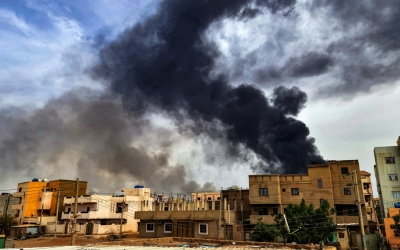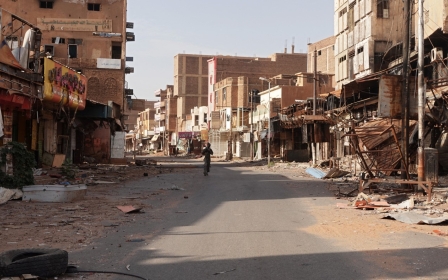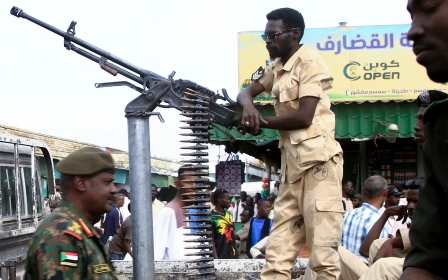Sudan war: Darfur faces its own 'Srebrenica' as el-Fasher fighting intensifies

At least a million civilians are trapped in unbearable conditions as fighting between the Sudanese Armed Forces (SAF) and Rapid Support Forces (RSF) intensifies in el-Fasher, capital of Sudan's North Darfur state.
Scores of people have been killed and significant damage has been done to buildings across the east and southeast of the city in the last few days, with the RSF burning over 20 villages in the neighbouring countryside as it seeks to take control of the army’s last remaining stronghold in the wider Darfur region.
With the city surrounded and besieged by the RSF, aid convoys have not been able to get into el-Fasher, and SAF’s 6th infantry division has had to drop supplies in via parachute.
El-Fasher has three major camps for internally displaced people (IDP) near it, with one of them, Zamzam, 12kms to the south, currently housing 450,000 people.
Thirty percent of children in the camp are acutely malnourished, according to Doctors Without Borders (MSF), and sources on the ground have reported deaths in the other camps. The medical organisation has warned that nowhere in el-Fasher is safe.
Stay informed with MEE's newsletters
Sign up to get the latest alerts, insights and analysis, starting with Turkey Unpacked
As the situation continues to darken and evidence that the RSF and its allied Arab militias are once again targeting non-Arab groups emerges, humanitarian organisations are demanding that international powers act to prevent the battle for el-Fasher from turning into “Darfur’s Srebrenica”.
“This is Darfur’s Srebrenica. Srebrenica was not distinct from other violence in Bosnia – it was a predictable crescendo of a predictable strategy to destroy and displace a people, as perpetrators besieged and cleansed those towns and cities,” Kate Ferguson, co-executive director of Protection Approaches, told a media briefing attended by Middle East Eye.
Over the last year of war in Sudan, the RSF has targeted non-Arab groups across Darfur, including in the cities of el-Geneina and Nyala, and in a massacre at Ardamata. The Raoul Wallenberg Centre recently found that there was “clear and convincing evidence” that the RSF was committing genocide in Darfur.
'It has become a battle for the dignity of el-Fasher’s people. So I can definitely tell you that el-Fasher won’t fall into the hands of those criminals'
- Soldier fighting against RSF
In 1995, over 8,000 Bosnian Muslim men and boys were systematically massacred by Bosnian Serb forces. "No one can say we didn't know. No one can cry ignorance. We have been here before," Ferguson said.
Kholood Khair, a Sudanese analyst and director of the think tank Confluence Advisory, told MEE: "No one can say they didn’t see this happening and just because it’s happening in slow motion, does not mean it’s not going to be as devastating as it has been elsewhere."
On Wednesday, the United States responded to the violence in el-Fasher by sanctioning two RSF commanders, Ali Yagoub Gibril and Osman Mohamed Hamid Mohamed. Gibril is the paramilitary’s central Darfur commander, while Hamid is a “major general in the RSF and the group’s head of operations”.
But Youssef Ezzat, political adviser to the RSF, told MEE: “Sanctions have a long history in Sudan, but they will not stop the wars. People are no longer concerned about them, so their impact is weak.”
A million lives
El-Fasher is the main hub for getting aid into the North Darfur region, which is already on the brink of famine. It is strategically vital to the RSF because it sits on its supply routes - the UAE and the Russian Wagner Group help facilitate these through neighbouring Libya, Chad and the Central African Republic - and to the army because it is the last city it holds in Darfur.
The city’s population has swelled to around a million because civilians have fled the neighbouring areas to escape the RSF, which now controls about 95 percent of Darfur, its traditional powerbase.
Civilians in and around el-Fasher are already dying of deprivation and are being killed in the crossfire between the warring parties. Humanitarian organisations fear they will soon become victims of the kind of targeted mass atrocities that the RSF has been accused of elsewhere in Darfur.
'The amount of structural damage caused this week is equivalent to the size of 61 football pitches – nearly one square km'
- Nathaniel Raymond, Yale Humanitarian Research Lab
The army’s sixth infantry division has been joined by rebel fighters from different factions of the Sudanese Liberation Movement (SLM) and by thousands of men brought back from Libya under the command of Musa Hilal, a former Janjaweed commander and old enemy of another former Janjaweed commander - Mohamed Hamdan Dagalo, the RSF chief better known as Hemeti.
Each side has accused the other of initiating the “final battle for Darfur” and of not upholding commitments to the international community not to bring the war to el-Fasher.
Eyewitnesses in the city told MEE that widespread atrocities are already being committed. Houses are being burnt and properties looted. The witnesses said they believed the perpetrators were RSF fighters, with the paramilitary and its allied Arab militias already controlling some of el-Fasher’s suburban neighbourhoods.
A fighter with the rebel SLM faction headed by Darfur governor Minni Minnawi, told MEE that clashes are intensifying in the north, east and south of el-Fasher. “We have defeated them in different neighbourhoods and now they are outside the city,” he said, referring to victories he claimed his men had scored over the RSF.
Yale’s Humanitarian Research Lab (HRL), which is closely monitoring the war, released a report on Wednesday in which it confirmed “significant conflict-related damage in the eastern and south-eastern neighbourhoods of el-Fasher city between 10-14 May 2024, consistent with reports of major fighting in el-Fasher, North Darfur during that period.”
“The amount of structural damage caused this week is equivalent to the size of 61 football pitches – nearly one square km,” Nathaniel Raymond, executive director of Yale’s Humanitarian Research Lab (HRL), told MEE.
Raymond said that heavy fighting has been "occurring in the eastern section of el-Fasher, as demonstrated by strong thermal signals from Earth orbital sensors which monitor fire activity," and that the RSF was known to be in the north and eastern sections of the city.
“HRL sees the situation in and around el-Fasher worsening significantly and quickly if RSF forces cannot be pulled back from the city immediately and if SAF bombardment operations continue in civilian areas. Humanitarian access must be established in el-Fasher and throughout Darfur as soon as possible, given unfolding famine conditions in the city and region,” he said.
A sea of fighters
The rebel fighter from SLM-Minnawi told Middle East Eye that his men and the army were being joined by the ordinary people of el-Fasher.
“The rebels and the army are fighting together, and the entire youth of the city has joined us to defend themselves,” he said. “It has become a battle for the dignity of el-Fasher’s people. So I can definitely tell you that el-Fasher won’t fall into the hands of those criminals,” he added, referring to the RSF.
SAF and rebel soldiers have posted videos on social media showing citizens of el-Fasher celebrating army victories, after different RSF attacks and attempts to advance in the city have been pushed back.
But the RSF has also posted a video that shows its soldiers controlling the main electrical power station, which is located inside the city. The paramilitary said it had repulsed 23 attempted attacks from SAF and its allied rebel movements.
“The Sudanese Armed Forces (SAF), its extremist mercenary groups, and its allied terrorist militias linked to the former regime continue to deliberately bombard the city of el-Fasher,” the RSF said in a statement, in which it also called Minni Minnawi “a hateful mercenary fomenting discord and ruin across Darfur”.
The army said it would continue fighting to liberate Sudan from what it describes as “mercenaries”.
“In an attempt to distort and rig the facts, the RSF has been attacking our forces since last Friday, but we repulse them and have inflicted a lot of losses on them. The RSF is lying and trying to tell the world that SAF is the one which initiated the attacks,” the Sudanese Armed Forces said in a statement.
Apart from SLM-Minnawi, the army is backed by factions of the SLM led by Mustafa Tambour and Abdul Wahid Mohamed al-Nur, as well as the Justice and Equality Movement (JEM) headed by current finance minister Jibril Ibrahim. Other smaller groups, styling themselves as a joint defence force, have also been formed to fight the RSF.
“Commander Karjakula of the SLM/Abdul Wahid arrived in el-Fasher last week from the Jebel Marrah mountains with his forces to join the defence of the city,” an officer with the Minnawi faction of the SLM told MEE.
“The commander has come recently from Libya and entered el-Fasher a few days ago with around 500 well-equipped military vehicles,” the source said.
The RSF is already allied with many Arab militias and claims that some fighters from the rebel groups, including Musa Hilal’s forces, have deserted and joined them.
Humanitarian catastrophe
El-Fasher's South Hospital, which is supported by MSF, has been inundated in the last week, receiving 454 casualties since fighting escalated on 10 May.
“There are snipers in the streets, heavy shelling is taking place, and nowhere is safe. Fifty-six patients have passed away, but the wounded and death toll is likely far higher, since the fighting continues to be so intense that many people cannot reach South Hospital,” Prince Djuma Safari, MSF deputy medical coordinator, said.
“Forty patients are waiting for surgery but the hospital is running out of supplies. Nowhere is safe in the city.”
The prospects for people displaced not only by this war, which has been raging since April last year, but Darfur's earlier conflicts, are equally dire. There are three major camps for internally displaced people (IDP) near el-Fasher: Zamzam, 12 kms to the south; al-Salam, also to the south; and Abu Shouk, on the city’s northern fringe. There are currently 450,000 people in Zamzam.
'Sanctions have limited even political impact, so why isn’t serious leverage being put on the ground?'
-Kholood Khair, Sudanese analyst
“The situation in the IDPs camps is deteriorating very quickly and the majority of the people in the camps are already dying because of hunger, especially the children who are suffering from severe malnutrition,” Adam Rojal, an IDP camp spokesman, told MEE.
The camps are also suffering from a lack of water, electricity, internet connection and a severe shortage of food. Rojal said that in Abu Shouk, nine displaced people had been killed and 40 injured after explosive materials had fallen on the camp.
He said that militias allied to the RSF were preventing food from entering the city, and that he knew of 20 cases in which civilians had died of hunger since the siege of el-Fasher began.
Adam Issa, who fled with his family from el-Fasher to neighbouring villages last month, spoke to MEE using a Starlink satellite internet connection from a town on the border with Chad. He said that like many other men from el-Fasher, he had moved his family to a safer place and was now intending to go back to the city to fight.
“Since the RSF is trying to enter the city and the fighting started to escalate, hundreds of families have been displaced, but the majority of men have chosen to put their families in a safer place outside the city and go back to fight to defend el-Fasher,” Issa, who belongs to the Zaghawa people, who have been targeted by the RSF, said.
Sudanese lives
Human rights groups, Sudanese activists, experts and many others have urged international powers to take some action to prevent another massacre from taking place in Sudan.
So far, their calls have gone unheeded. Ferguson, who is British, spoke at the media briefing of a desperate need to see a “surge in diplomatic activity”, including from her own country.
The massacre at Srebrenica took place on 11 July. Speaking of el-Fasher, Ferguson said: “We are on 10 July.” Recalling western failures to prevent the massacre in Bosnia, she said: “Sometimes governments don’t see what’s in front of them."
“Sanctions have limited even political impact, so why isn’t serious leverage being put on the ground?” asked Khair, the Sudanese analyst.
She told MEE that she had noticed, during the early period of war, that the only time Khartoum fell silent was when international citizens were being evacuated.
“When it’s important enough to them, the international community does put down the right kind of leverage and disincentive structures for the belligerent sides to put down their weapons,” Khair said.
“But clearly it has placed a premium on the lives of internationals rather than those in Darfur and elsewhere in Sudan... The fact that atrocity prevention is completely missing from this, even though we know atrocity risk is high and genocidal acts have already taken place in other parts of Darfur, is a criminal abrogation of responsibility by the international community."
Middle East Eye delivers independent and unrivalled coverage and analysis of the Middle East, North Africa and beyond. To learn more about republishing this content and the associated fees, please fill out this form. More about MEE can be found here.






